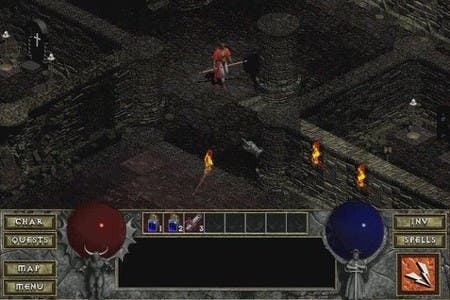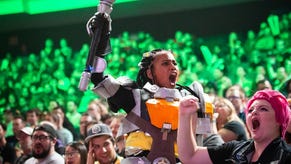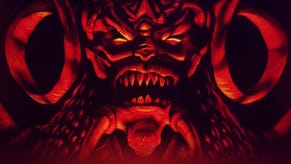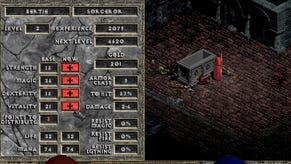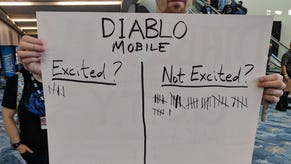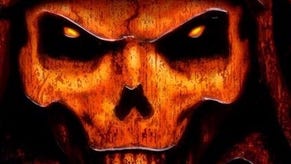Retrospective: Diablo
Sympathy for the Devil.
It's just so grimy. Even sixteen years on, playing the game with the aid of a Windows 7 fix and looking at it with eyes that have seen the strangest and darkest moments of Silent Hill, of Vampire: The Masquerade and of Dead Space, Diablo still remains a grim and morbid experience. Everything in the game is shot through with this bitty, dirty quality, and though I'm sure this is as much a product of its engine as it is any deliberate stylistic choice, it doesn't make the experience any more pleasant.
Then there's the music. The rampant throbbing of distant drums, distorted instruments and the occasional, sudden scream echo about the underground levels. It's really not nice. You get to listen to this while great bulbous demons charge at you from the darkness and horrid spindly things scuttle forward to cough acid in your face. Everything chases you. You wish the screen was a little bigger and you can't see anything in this damn darkness. You take the stairs down one more level and find the caverns below snaked with lava, thronging with vermin. Diablo was never, ever a game that was nice to you.
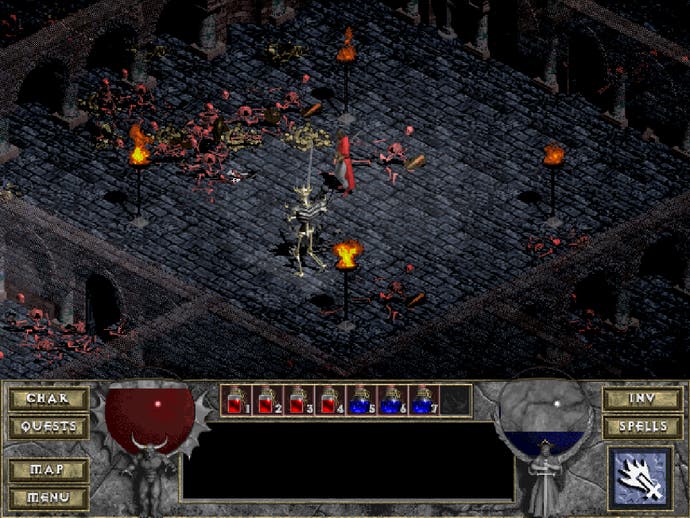
So you responded in kind, in the only way you knew how. You beat the life out of everything that stood in your way, scooping up whatever loot you could carry and pressing on toward your goal, only to find the game's ending was not a story of salvation, but one of further suffering. Raw deal.
What's more, you probably had a fantastic time throughout. Diablo wasn't so much a shot in the arm for PC RPGs as it was a kick in the balls and an order to man up. A fast, furious reinvention of the roguelike, it had the pace and the atmosphere of Doom, but was still built around the stats and quests of traditional roleplaying games and proved to be a dangerously addictive combination. Brought up on a genre that was heavily influenced by Dungeon Master types, I was used to RPGs being a sedate, comfortable experience, often plodding and turn-based. Diablo was like cosying into this familiar sofa once again, only to find someone had transformed it into a rocket sled.
And there's nothing like a ride on a rocket sled to make you realise how far you've come. I'd imagine that Diablo's influence on the modern RPG was almost incalculable, giving the whole genre a firm shunt towards action and real-time play. As well as your armour class and your thit percentage, there was a new factor to consider: how fast you could click your mouse. Still, it was firmly rooted in the genre and proudly showed off its roguelike influences with its randomly generated dungeons and items, as well as its wealth of monsters that you gradually came to understand as you slaughtered more and more of them.
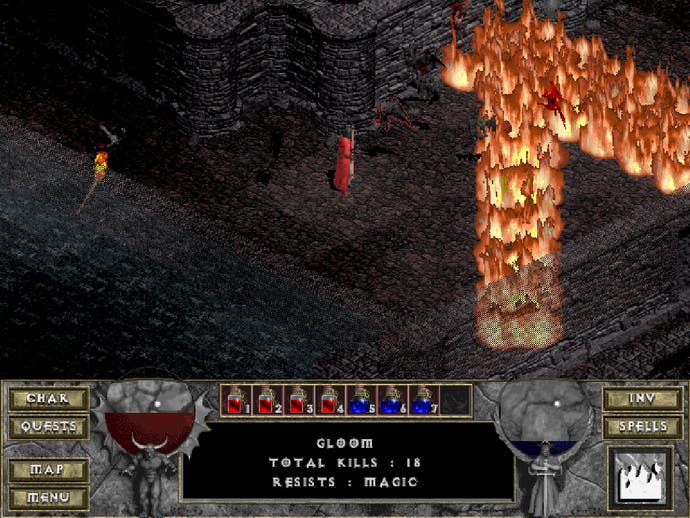
Diablo was also one of the first games I ever played online and it taught me about that unique and unkind phenomenon that is lag, the cruel death that can defeat even the toughest adventurer. It gave me a different kind of challenge to the shooters that were taking off in the late 90s, a challenge that was much more involved than simply seeing how quickly I could move a crosshair over an opponent's head, and it was Diablo that gave me a chance to form my first meaningful relationships with other players.
Regular trips into the game's town to trade or sell items, swap tips or plan adventures naturally leads you towards conversation and co-operation. Back then, in my late teens, I didn't know much about where my fellow players came from, but I did know that people over there loved games too. At the same time, the game community was riddled with cheaters. It turned out that it was far too easy to hack items and characters to manipulate their stats. Plus ça change.
Playing Diablo again now, I still see much of its original appeal shining through and the game remains surprisingly addictive. At its core it's the purest form of that roleplaying treadmill, that drive to press deeper underground, to fight ever greater monsters and to hoover up ever more powerful and expensive items of loot to feed your progress. I again find myself laughing or groaning at the same things that my friends and I used to.
Many of the enemies are variations on the same theme and as yet another monster bursts into a shower of coins, I'm reminded of how painfully difficult it can be to spot dropped items among the game's murky environments. As I run my mouse pointer back and forth over the shadows I may as well be scrabbling around in the dark on my hands and knees. This is also the Diablo I remember, so gothic it'd force Edgar Allan Poe to turn up the gamma correction.
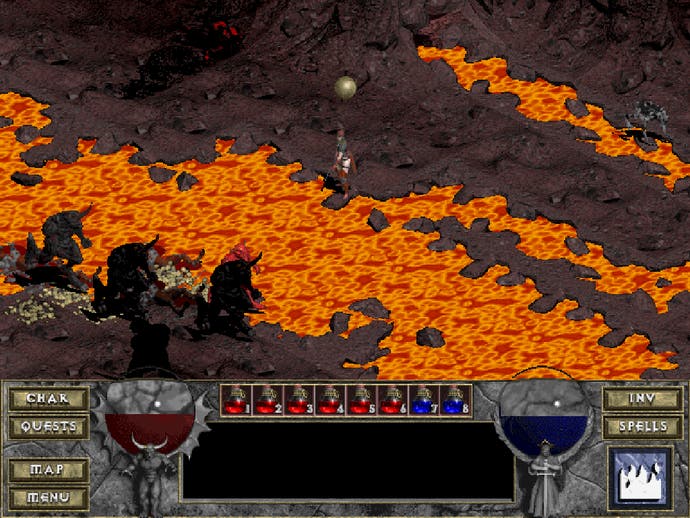
Then there's ridiculous noises made by many of the monsters; the comic trampoline-like sound of a town portal stretching itself open; the overacted monologues given by the voice cast. "Stay awhile, and listen!" insists Cain, wise old man of the town, for the twentieth time that day. I don't want to listen any more and I don't want him rooting through my pack, so I've bought spell scrolls that allows me to identify items I bring home instead. I hope I never need to speak to him again, nor endure another one of the crotchety old sod's sprawling dialogues. Then I find myself rolling my eyes as Matt Uelmen's infamous, incessant and over-produced guitar track reaches its crescendo once again.
But all this was part of the Diablo experience. While the game itself was an excellent example of roleplaying mechanics married with frantic action, the narrative built around it was often grandiose and overwrought. Those voice actors were certainly trying very hard, that music was certainly as emphatic was it could be and the story was squeezed into the action at awkward and inopportune moments, though I did love how the whole thing ended on a downer, an example that more games need to follow.
Four years later, Diablo 2 would do a better job of integrating its narrative with its action and, with the imminent arrival of the third game, Blizzard are showing off all kinds of ways that the series has made progress with its storytelling. Still, for me the atmosphere of old was quite sufficient, a perfectly appropriate canvas for me to fight my way across. Whatever claims its plot may make, Diablo was only ever about one thing: beating ten shades of s**t out of the bad guys until you were bored. And that was never any time soon.
